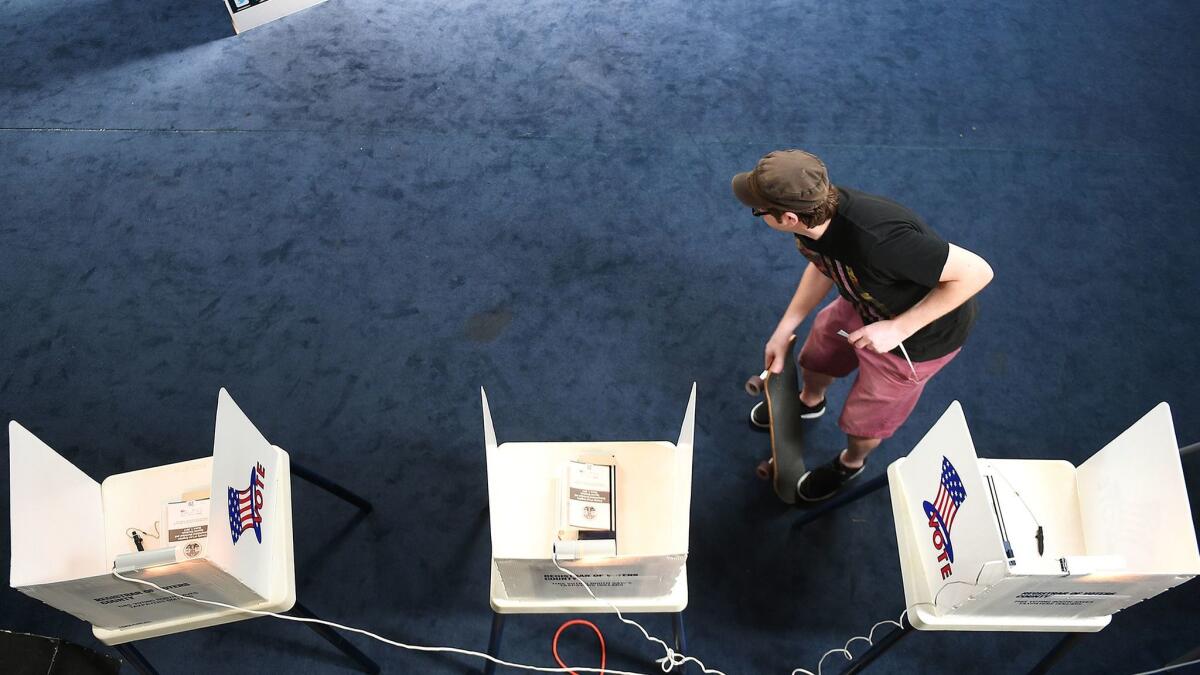Op-Ed: Election turnout was abysmal in L.A., and that means trouble for Democrats nationwide

- Share via
Los Angeles County had a dismal turnout rate in the March 7 election, the first chance for voters to express themselves at the ballot box since Donald Trump’s stunning victory. People here seem more political than in the past — they go to a lot of protests and town halls, and they fill their social media accounts with anti-GOP screeds. But less than 12% of eligible voters showed up.
This suggests that hatred of our new president isn’t sufficient to get out the vote.
Granted, the election was a local affair. The most controversial questions for voters involved measures to regulate the cannabis industry and restrict development. The national GOP was not on the ballot. Neither was Trump.
And yet, politicians and activists, eager to combat the usual off-year, off-season voter apathy, certainly tried to inject Trump in the race.
His name and face were everywhere and a part of almost every campaign. He was on mailers, mobile ads and door hangers. Candidates and interest groups worked overtime to show that their opponents were somehow supportive of, aligned with or of similar cast of mind to the unpopular man in the White House.
Tuesday’s election was the first test of Democratic energy in the age of Trump...They came nowhere near to passing that test.
And after millions of dollars were spent making Trump the issue on everything from land use decisions to fixing potholes, Angelenos stayed home.
That could mean trouble for Democrats nationwide.
The message to liberals from the top down has been that activism starts at home; the Democratic Party is in so much trouble in part because Republicans have paid much closer attention to less glamorous races, like ones to control the city council.
Arguably, Tuesday’s election was the first test of Democratic energy in the age of Trump. Or, more precisely, the first test of whether that energy will manifest itself at the ballot box. The party’s core constituencies — urban progressives, Latinos, the last remaining unionized workers and the poor — are also L.A.’s core constituencies.
They came nowhere near to passing that test. Twelve percent is an F, even with grade inflation.
The question for Democrats: If these core groups in L.A. didn’t show up on Tuesday, will their counterparts elsewhere show up for the 2018 midterm?
Perhaps there’s a cosmetic solution to this problem — better messaging, for instance — but perhaps not.
Voter turnout for a local election peaked at 76% in 1969, when Tom Bradley challenged incumbent Mayor Sam Yorty. Back then, it was actually much harder to vote. That was before motor-voter registration, before it was so common for Angelenos to send in their ballots by mail.
But the area was also more prosperous. According to the U.S. Bureau of Economic Analysis, in 1969 Los Angeles had a per capita personal income in the top 10% of U.S. cities. By 2009, per capita personal income had collapsed to the point where Los Angeles was in the fiftieth percentile. In that same year, voter turnout also collapsed to a then record low 18%.
A report issued last week by the Los Angeles Economic Development Corporation made clear that the region is not in good health, economically. As summarized by this newspaper, the report “found that since the recession, the county has replaced jobs in manufacturing and finance, which tended to pay well, with less remunerative restaurant gigs and low-level positions in healthcare.”
The middle class is in decline. And as it declines, so, it seems, does voting. That’s the story of Los Angeles, but perhaps it’s also the story of the Democratic Party.
If Democrats want voters to show up — and they’ve long argued that when more people show up, they win — they may have to prove to people who have less and less of an economic stake in our society that voting really matters. And to do that, they’re going to have to do more than remind everyone that Donald Trump is in the White House.
Mike Madrid is a California political strategist. He is a partner at GrassrootsLab.
Follow the Opinion section on Twitter @latimesopinion or Facebook
A cure for the common opinion
Get thought-provoking perspectives with our weekly newsletter.
You may occasionally receive promotional content from the Los Angeles Times.



